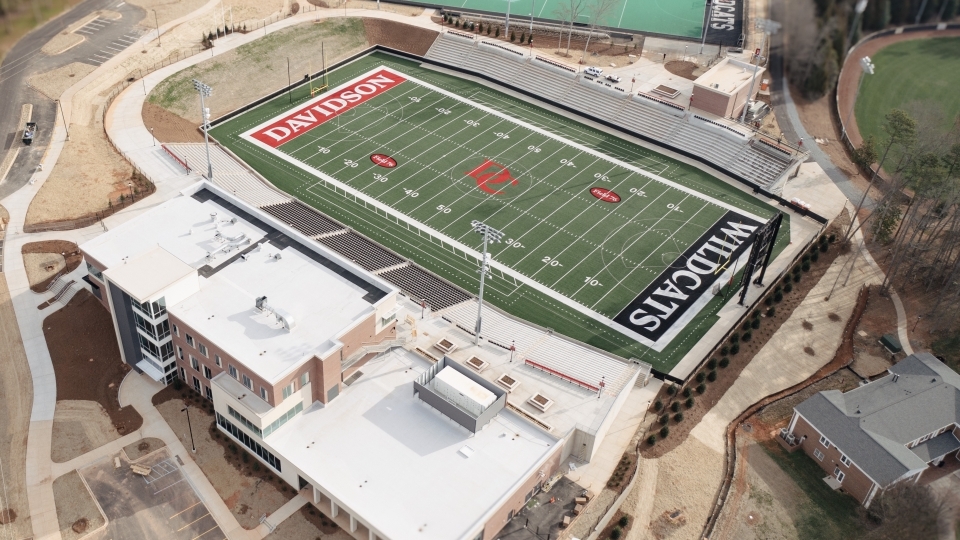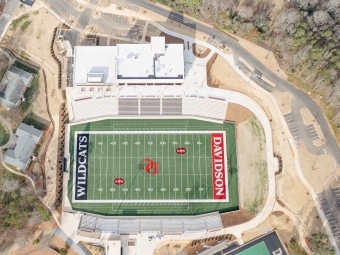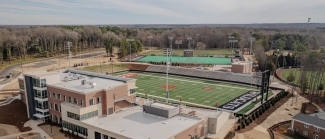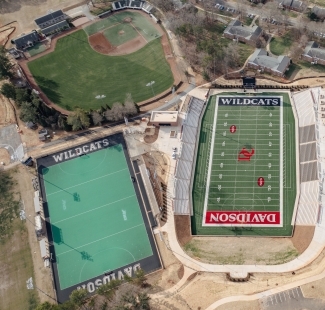New Home for Wildcat Spirit: Stadium Opens to Sticks, Pigskin and Celebration
April 19, 2024
- Author
- Justin Parker

A duo of games and sports on Saturday, April 20, will officially open Davidson College Stadium and Game Changers Field House.
A midfield celebration, punctuating between a lacrosse match and football game, will mark the completion of the new, 5,000-seat, multi-million-dollar facility — the new home for both sports. The stadium’s gently sloping bowl, individual chairback seating and food and drink concourse create a new level of fan experience. The training and conditioning equipment and space put Davidson in the top tier of facilities and create dazzling new tools with which coaches can recruit new players.

The new facility boasts a spacious sports performance center, fueling station, study areas, training rooms and team lounge.
Davidson College Stadium, anchored on the northern-most end of campus, already enjoyed a soft open by hosting three lacrosse games over the past month. The complex houses an expanded sports performance center and a top-of-the-stadium box, Gallery 18, that serves as a versatile hospitality space with innovative, accordion windows that can slide away and open to the sights, sounds and smells of the game.
“It’s truly transformative in terms of what it allows us to do and what we can envision our scholar-athletes, our teams and our programs to do moving forward,” Vice President and Director of Athletics Chris Clunie ’06 said. “Bringing everything together with the field house, with the stadium, with the field, sports performance, training, wellness, hospitality, everything … this enhances everything we do in Davidson Athletics.”
Davidson lacrosse Coach Kim Wayne’s team will lead off Saturday’s festivities with a 1 p.m. contest against St. Bonaventure.
That will be followed by a stadium dedication ceremony at 3:45 p.m.
Then it’ll be time for Coach Scott Abell’s football team to take the field. His Wildcats will practice at 4 p.m., then host an inter-squad spring game at 4:30 p.m.
Abell and his staff moved into their new offices within the 12,000-square-foot Game Changers Field House a few weeks ago, and the players dispersed into an expanded, more user-friendly locker room. Field 76, named in honor of longtime Wildcats coach Dave Fagg ’58, upgrades the turf itself.
The stadium raises the capacity of virtually every aspect of the football program, said Abell, who has led the Wildcats to new heights in his six seasons, including two Pioneer Football League titles and three FCS Playoff appearances.
The ability to get some extra study time...the ability to relax, get some extra nutrition — it’s really something that we thought we could only imagine, but now it’s real, and it’s better than we ever imagined.
Coach, Football
“The new facilities change the way we’re now going to operate the program, the way we can function day-to-day,” he said. “From the time they wake up in the morning as scholar-athletes, as football players, until the day ends, the workouts, our practice, the ability to get some extra study time in here, the ability to relax, get some extra nutrition — it’s really something that we thought we could only imagine, but now it’s real, and it’s better than we ever imagined.”
That centralization of operations is a common thread among the players and coaches of multiple sports. Davidson field hockey will not play its games in the new stadium but is benefiting with new locker room space adjacent to its home turf, Carol Grotnes Belk Turf Field. Already, the facility’s proximity is paying dividends.


“We used to be lifting in one spot, and our locker room was in one spot, and if we wanted to do film, it was in another spot,” said field hockey coach Zoe Almquist. “Then we had to come out to practice. So now having everything right here together just saves them so much time, and I think time is such a valuable currency. So, to have everything centralized in one spot just makes everything much more efficient and lets us do a lot more work.”
The new stadium is also proving to be an easy pitch for recruits. Prospective Wildcats see a spacious sports performance center that, at 7,000-square feet, is two-and-a-half times larger than the previous one. They see a brand-new artificial turf field, with bright lines, an interlocking DC at midfield and black and red end zones. And they can imagine themselves taking advantage of the fueling station, study areas, training rooms and team lounge.
“The traction we’re getting,” said Abell, “with the amount of visits in recruiting and the next generation of scholar-athletes that want to see this facility, I’m excited about what that means for us and our future.”
On the night of Sunday, March 10, the football, lacrosse and field hockey teams got a sneak peek at their new locker rooms, the stadium and the inner workings of the field house. What they had seen only in artist renderings was now real.
“The smiles on their faces the second they walked into the stadium told the full story,” Wayne said.
Clunie said there are many “thank-yous” to go around, from former President Carol Quillen to current President Doug Hicks ’90, to the college’s senior leadership and board of trustees to Chief Financial Officer Ann McCorvey and College Relations staff. Then there are those who oversaw the day-to-day challenges and progress, including Director of Facilities and Engineering David Holthouser and Senior Associate Director of Athletics Scott Applegate. And then there are the many alumni, donors and supporters who helped make it all possible.
“This really doesn’t happen without the people,” Clunie said. “We’ve always talked about doing more with more, and so many people embraced that. This facility is a perfect embodiment of that coming together.”



